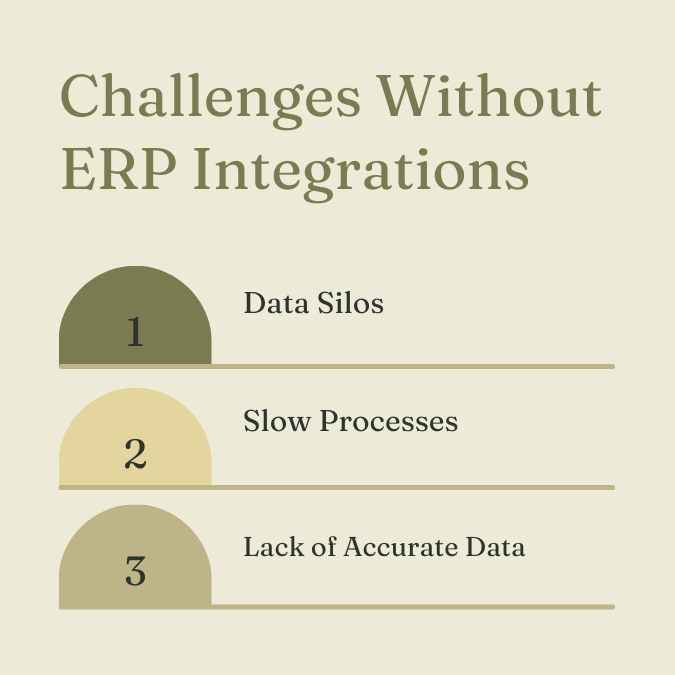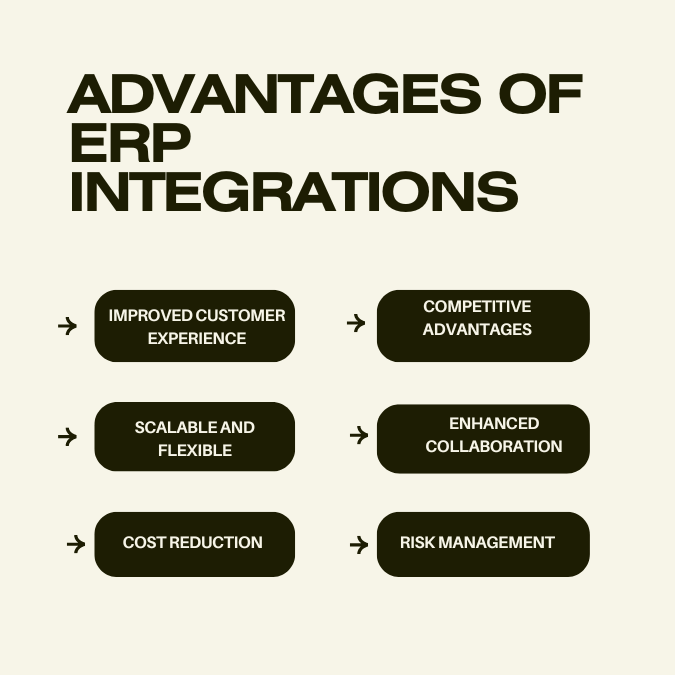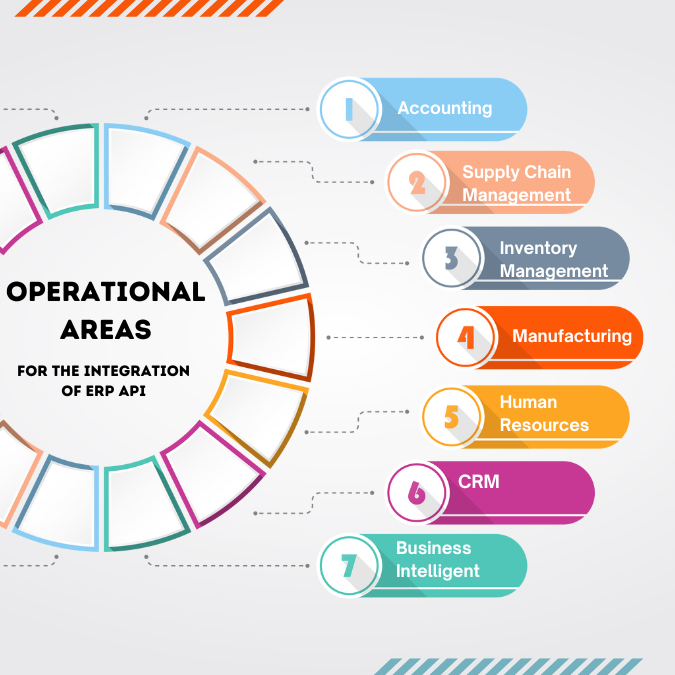Table of Contents
The global ERP market is poised to reach a staggering $117.09 billion by 2030. By automating routine tasks, ERP systems empower businesses to concentrate on strategic initiatives. ERP Integrationhelps business in many things like:
- Streamline operations
- Reduce errors
- Optimize the use of resources
- Save costs
- Boost ROI
- Enhance profitability
However, considering that every business has unique needs to cater to with ERP software implementation, it is no wonder that only 3% of companies are using it with out-of-the-box functionality. In contrast, others require some degree of customization.
ERP integration has become essential to facilitate these customizations. Leading ERP software companies are ensuring that these integrations are easy and seamless with the help of APIs.
If you're considering integrating ERP into your SaaS product but have some doubts, you're in the right place.
This article will provide a comprehensive overview of ERP integration, emphasizing the significant impact that ERP APIs have on enhancing business processes, making them more efficient and adaptable.
We will explore the benefits of ERP integration, the challenges companies face without it, key operational areas affected, common approaches to ERP API management, and the best platforms available for ERP integration services.
What Is ERP Integration?
ERP integration refers to the method by which a company connects and synchronizes its ERP software with other business applications like:
- Accounting
- Supply-chain Management
- Inventory Management
- Manufacturing
- Human Resource
- CRM
- eCommerce
- Business intelligence
- Analytics
and other data points and databases that your business uses for its operations.
With the integration of ERP API, you can automate, streamline, and scale your business's operations. In fact, the APIs in ERP integration will help the different software programs communicate, exchange data with each other and execute tasks.
Thus, with ERP integration, you will be able to achieve a smooth and error-free data transfer that eliminates the risk of errors and the need for manual data entry. It will also make sure that the predefined rules and protocols are adhered to when the software are interacting with each other.
Challenges Faced by Companies in the Absence of ERP Integrations

Three of the most common challenges that companies face in the absence of ERP API integrations are:
1. Data Silos
ERP integration centralizes and compiles data from multiple sources and brings it to one platform. This makes it easy and convenient for your employees, departments, and multiple teams to access it.
Without the integration of an ERP API, your company will struggle with data silos where the data from one individual, department, or team will be isolated from the rest of the company.
This leads to duplicate data, difficulties in collaboration and information sharing, utilization of more storage space, less informed teams, poor decision-making, and time wasted collecting data that already exists but could not be found due to the absence of integration.
2. Slow Processes
Another challenge that companies face due to the absence of ERP integration is slow processing. This is because there is a need for manual intervention to get the repetitive tasks done.
Without automation, this means that the processes will take longer to complete, while also making them prone to errors. It can also result in some data becoming missing because it was not entered in the first place.
Additionally, in case of errors and missing data, their identification and rectification will have to be done manually as well, which will again take longer than it would if your company had an integration of ERP API.
3. Lack of Accurate Data
ERP integration is best at automatically collecting data from each system and storing it in its central repository. Without an ERP integration, if anyone needs any data, they will need to go to each system, look for the information they need, and then complete their task.
However, there is a high chance that this information is either not updated instantly or has some errors because it was entered manually. In both cases, the accuracy of the data is affected, which in turn will impact the efficiency of your business operations.
Advantages of ERP Integrations

Most businesses have started resorting to ERP integrations to boost their productivity, profitability, and competitive edge.
This is because of the following advantages offered by the integration of ERP API:
1. Improved Customer Experience
API-enabled ERP integration can help your company have a one-stop solution for all its needs, including data storage. Integrating ERP API offers multiple benefits, including enhanced data analysis, streamlined operations, improved customer interactions, and automated tasks. This empowers you to make informed decisions, boost efficiency, and drive business growth. Thus, with ERP integration, you will be more satisfied and have a positive experience of using this software.
2. Get an Edge Over Competitors
ERP integration will help your company gain a competitive advantage over its rivals because it will allow you to integrate with multiple systems. Additionally, you will be able to sync data and insights across a wide variety of items and attributes, which will help you identify opportunities to take advantage of and challenges to prepare for. It will also help you expand your market reach, including entering new markets. Thus, in the dynamic and competitive business world, integration of ERP API will help you succeed.
3. Easily Scalable and Flexible
API-enabled ERP integrations tend to be easily scalable, adaptable, and flexible. They will allow you to connect new systems, features, processes, and applications in your ERP ecosystem.
4. Enhanced Collaboration
With ERP integrations, departments across the organization can collaborate more effectively. Integrated systems facilitate real-time data sharing and communication, breaking down silos and improving teamwork. This enhanced collaboration leads to more coordinated efforts and better decision-making across the company.
5. Cost Reduction
Integrating ERP APIs can significantly reduce operational costs by automating repetitive tasks and minimizing manual errors. Automation leads to more efficient use of resources and time, allowing employees to focus on higher-value activities. Moreover, a unified system reduces the need for multiple software licenses and maintenance costs, providing further cost savings.
6. Better Compliance and Risk Management
ERP integrations help businesses maintain compliance with industry regulations and standards by centralizing data and automating compliance-related processes. This integration ensures that data is accurate, up-to-date, and easily accessible for audits and reporting.
Additionally, it enhances risk management by providing real-time visibility into potential risks and enabling swift action to mitigate them.
This will thus support your business's growth while meeting its evolving requirements. It will also help your business quickly respond to changing market demands and expand without constraints.
Operational Areas for the Integration of ERP API

Some of the most common operational areas for the integrations of ERP API that most businesses use are:
1. Accounting
Accounting is one of the most important ERP integrations because it helps businesses automate and streamline their finance functions, such as budgeting, cost management, cash flow management, vendor payments, billing, and activity-based costing.
With the help of ERP integration, you will have access to real-time insights and analytics on the financial performance of your company. This will help you ensure compliance with relevant regulations while also improving your decision-making.
2. Supply Chain Management
ERP integration with supply chain management modules will help your business with functions like purchasing, supplier scheduling, product configuration, claims processing, goods inspection, and warehousing. This integration will also streamline and automate order processing and distribution tasks of your business.
3. Inventory Management
ERP integration with inventory management modules will assist your business in efficiently controlling inventory quantities by tracking down their quantities and SKUs. It will also help you factor in your incoming inventory by integrating it with the procurement module.
This will help you control your inventory costs, ensuring that you have sufficient inventory without tying up too much capital. It will also help you plan your inventory turnover according to your sales trends, boosting your profit margins.
4. Manufacturing
In the case of ERP integration with manufacturing modules, some of the core functionalities that your business will get access to are scheduling capacity, engineering, quality control, workflow and product lifecycle management.
This will help your business accurately plan its production runs while ensuring that it has all the required resources. It will also let your business keep track of goods-in-progress and compare the actual output against the forecasted output.
5. Human Resources
Human resources is one of the other key operational areas of ERP integration. The human resources module allows you to easily gather and interpret data on recruitment, training, payroll, diversity management, benefits, and retirement.
You will also have tools and dashboards to monitor the performance of your individual employees, departments, and job roles. To do so, you will have to shortlist some key performance indicators (KPIs). It will become easy and convenient for you to keep track of the hours worked, overtime, and paid time off of each of your employees.
6. CRM
CRM (Customer Relationship Management) is one of the go-to tools for every company's sales and marketing team because it gives them access to every lead's information and history.
The insights from this will allow them to personalize their interactions with your customers, leading to a better customer experience and higher chances of conversion.
7. Business Intelligence
ERP integration with Business Intelligence (BI) modules is vital for companies looking to leverage data-driven insights for strategic decision-making. BI integration provides powerful analytics tools that gather, process, and present data from various departments within the organization, such as finance, sales, HR, and operations.
With BI integrated into your ERP system, your business can benefit from real-time data visualization through dashboards and reports, helping you identify trends, forecast performance, and uncover actionable insights. This integration allows for more informed decision-making by providing a comprehensive view of the company's performance across all departments.
Common Approaches to ERP API Management
The 3 most common approaches to ERP API management that will let you maximize the benefits of ERP integration and avoid its drawbacks are:
1. Native Integrations
Under native integration approach, your developer will build and maintain all the ERP integrations themselves. Thus, you can manage the integrations independently without relying on third parties.
However, this approach is viable only when you need a limited number of ERP API integrations with a narrow scope. Thus, this approach will not be able to keep up with a growing business.
2. Embedded iPaaS
Through its workflow builder, an embedded iPaaS will enable you to create and develop integrations. Incorporating ready-made connectors will expedite the integration development process.
Although utilizing this platform may require technical expertise, it provides a robust and flexible environment for businesses that want to carefully manage their ERP integrations. This approach is particularly beneficial for organizations that prioritize thorough testing and customization, ensuring that each integration aligns perfectly with their specific needs and business processes.
Additionally, the ability to focus on one integration at a time allows companies to maintain a high level of quality and performance, making embedded iPaaS an excellent choice for precise ERP integration tasks
3. Unified APIs
A unified API solution is one of the best approach because it will let you access various ERP integrations through a single API framework. This approach is thus scalable and flexible, making it best suited for growing businesses.
Your integration oversight functions, security controls, common models, and integrations will vary depending on the unified API solution you choose.
API Integration Tools
API Integration tools will help your team build, manage, and publish APIs. With these tools, different software systems will be able to share data with each other after following the relevant rules and protocols.
One of the most popular API integration tools that you must consider for facilitating ERP integration is Cobalt.
Cobalt, the #1 Unified API Platform
Cobalt is a unified API platform that will support native API integrations. It comes with an AI agent that will help you build connectors for third-party app integrations within 10 minutes.
With its embedded iPaaS, you can also control what your ERP system users can configure. It offers full visibility into every execution so that you can know what exactly happened.
Additionally, it also comes with automated and customizable security features that will help you protect your customers, data, and reputation.
Cobalt also comes with solutions like orchestration builder that will let you define the integration logic, one data model that will allow you to seamlessly build more than 1000+ integrations, and white-labeled authentication in terms of key-based authentication and OAuth for third-party apps.
Its infrastructure is easily scalable, flexible, and adaptable, supporting your business's growth by meeting its evolving needs. Additionally, it will give you real-time updates when there is a technical error and come with features for changelog management. This will ensure a positive customer experience.
Wrapping Up
If you want to streamline your business operations, enhance data accuracy, and improve decision-making, ERP integration is a must. With the help of ERP API integrations, you will also be able to improve your ROI and ensure enhanced customer satisfaction.
With ERP integration, you will also be able to beat challenges like data silos, inaccurate data, and slow processes. This will further boost the efficiency and productivity of your business operations.
In fact, by choosing a unified API platform like Cobalt, you will be able to connect multiple ERP integrations through a single platform. This will ensure that you are able to meet all your business needs while minimizing integration complexities. This tool for integrating ERP APIs is scalable and flexible, making it an asset for every business.
Learn more about Cobalt by scheduling a call with us.

